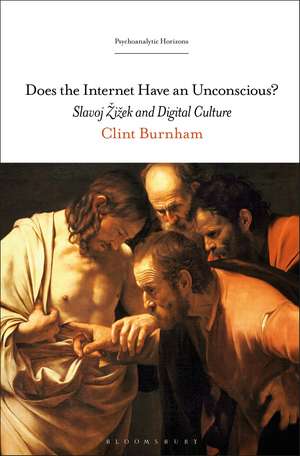Does the Internet Have an Unconscious?: Slavoj Zizek and Digital Culture: Psychoanalytic Horizons
Autor Professor Clint Burnhamen Limba Engleză Paperback – 27 noi 2019
| Toate formatele și edițiile | Preț | Express |
|---|---|---|
| Paperback (1) | 229.41 lei 43-57 zile | |
| Bloomsbury Publishing – 27 noi 2019 | 229.41 lei 43-57 zile | |
| Hardback (1) | 713.45 lei 43-57 zile | |
| Bloomsbury Publishing – 30 mai 2018 | 713.45 lei 43-57 zile |
Din seria Psychoanalytic Horizons
- 14%
 Preț: 193.36 lei
Preț: 193.36 lei - 7%
 Preț: 155.84 lei
Preț: 155.84 lei - 23%
 Preț: 197.86 lei
Preț: 197.86 lei -
 Preț: 154.50 lei
Preț: 154.50 lei - 7%
 Preț: 121.14 lei
Preț: 121.14 lei - 7%
 Preț: 123.53 lei
Preț: 123.53 lei - 8%
 Preț: 99.06 lei
Preț: 99.06 lei - 8%
 Preț: 146.12 lei
Preț: 146.12 lei - 8%
 Preț: 145.90 lei
Preț: 145.90 lei - 22%
 Preț: 226.51 lei
Preț: 226.51 lei - 23%
 Preț: 221.28 lei
Preț: 221.28 lei - 22%
 Preț: 224.29 lei
Preț: 224.29 lei - 23%
 Preț: 221.91 lei
Preț: 221.91 lei - 21%
 Preț: 216.99 lei
Preț: 216.99 lei - 8%
 Preț: 152.28 lei
Preț: 152.28 lei - 21%
 Preț: 218.54 lei
Preț: 218.54 lei - 21%
 Preț: 216.88 lei
Preț: 216.88 lei - 7%
 Preț: 156.28 lei
Preț: 156.28 lei - 24%
 Preț: 194.93 lei
Preț: 194.93 lei - 23%
 Preț: 190.75 lei
Preț: 190.75 lei - 30%
 Preț: 537.87 lei
Preț: 537.87 lei
Preț: 229.41 lei
Preț vechi: 296.36 lei
-23% Nou
Puncte Express: 344
Preț estimativ în valută:
43.90€ • 45.96$ • 36.32£
43.90€ • 45.96$ • 36.32£
Carte tipărită la comandă
Livrare economică 07-21 aprilie
Preluare comenzi: 021 569.72.76
Specificații
ISBN-13: 9781501360145
ISBN-10: 1501360140
Pagini: 240
Ilustrații: 3 b/w illustrations
Dimensiuni: 140 x 216 x 11 mm
Greutate: 0.28 kg
Editura: Bloomsbury Publishing
Colecția Bloomsbury Academic
Seria Psychoanalytic Horizons
Locul publicării:New York, United States
ISBN-10: 1501360140
Pagini: 240
Ilustrații: 3 b/w illustrations
Dimensiuni: 140 x 216 x 11 mm
Greutate: 0.28 kg
Editura: Bloomsbury Publishing
Colecția Bloomsbury Academic
Seria Psychoanalytic Horizons
Locul publicării:New York, United States
Caracteristici
Serves as a general introduction to Zizek's thought in addition to delving deeper into the applications of his theories
Notă biografică
Clint Burnham is Professor of English at Simon Fraser University, Canada. He is the author of Fredric Jameson and The Wolf of Wall Street (Bloomsbury, 2016).
Cuprins
List of FiguresList of AbbreviationsAcknowledgmentsIntroduction1. Does the Internet Have an Unconscious?2. Slavoj Zizek as Internet Philosopher3. Was Facebook an Event?4. Is the Internet a Thing?5. The Subject Supposed to LOL6. Her: Or, There Is No Digital Relation (with Matthew Flisfeder)7. The Selfie and the CloudConclusionNotesIndex
Recenzii
Clint Burnham does not merely apply psychoanalysis to the internet; he demonstrates how the unconscious itself is 'structured like the internet,' how our entanglement in the impenetrable digital web allows us to understand properly the way the unconscious overdetermines our thinking and activities. This is why Burnham's path-breaking book reaches much deeper than the usual analyses of the social and psychological implications of the internet: it does not just socialize and historicise the internet, it throws a new light on the unconscious itself.
Clint Burnham has produced the definitive psychoanalytic account of digital culture. This is the book that those seeking to understand how the unconscious manifests itself in the digital universe have been waiting for. For too long, psychoanalytic theorists have confined themselves to analyses of film and literature, but now Burnham provides the breakthrough. Far from being an application of psychoanalysis to a foreign realm, the digital provides the privileged ground for encountering the unconscious. As Burnham's delightful and witty prose indicates, the internet functions as an event with concrete ramifications for the psyches that emerge in its wake.
Were there ever two formations with less in common than 'the Internet,' a machinic transmission of discrete data, and 'psychoanalysis,' a wild science of messy social relationality? Clint Burnham's genius is to show how psychoanalysis is indispensable to any robust theory of digital culture, but as well to reveal the cybernetics already at work in psychoanalytic theory from Freud to Zizek. In readings of multiple media, he vividly demonstrates the ongoing necessity of concepts like negation, enjoyment, and disavowal for making sense of aesthetic productions like cinema, social experiences like Facebook, and the cyber mode of production that binds online pleasures to offline battery factories. This is an expansive, fascinating book, offering its readers a dazzling plenty of speculation and critique.
Clint Burnham has produced the definitive psychoanalytic account of digital culture. This is the book that those seeking to understand how the unconscious manifests itself in the digital universe have been waiting for. For too long, psychoanalytic theorists have confined themselves to analyses of film and literature, but now Burnham provides the breakthrough. Far from being an application of psychoanalysis to a foreign realm, the digital provides the privileged ground for encountering the unconscious. As Burnham's delightful and witty prose indicates, the internet functions as an event with concrete ramifications for the psyches that emerge in its wake.
Were there ever two formations with less in common than 'the Internet,' a machinic transmission of discrete data, and 'psychoanalysis,' a wild science of messy social relationality? Clint Burnham's genius is to show how psychoanalysis is indispensable to any robust theory of digital culture, but as well to reveal the cybernetics already at work in psychoanalytic theory from Freud to Zizek. In readings of multiple media, he vividly demonstrates the ongoing necessity of concepts like negation, enjoyment, and disavowal for making sense of aesthetic productions like cinema, social experiences like Facebook, and the cyber mode of production that binds online pleasures to offline battery factories. This is an expansive, fascinating book, offering its readers a dazzling plenty of speculation and critique.
